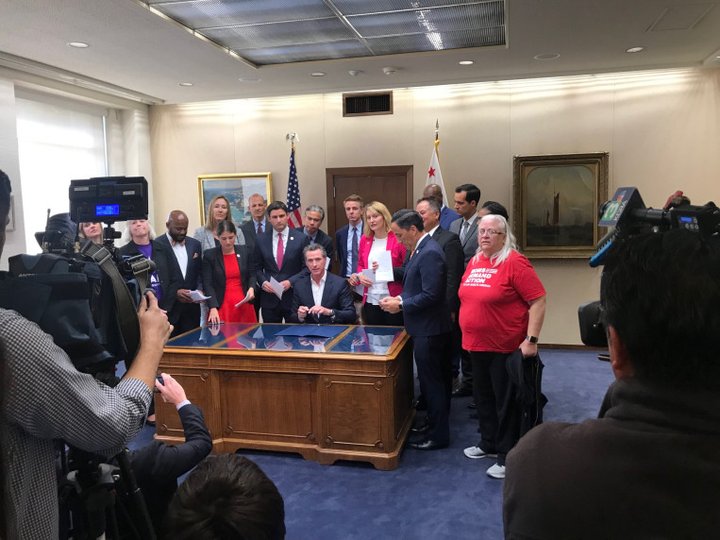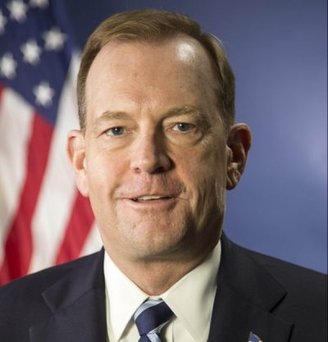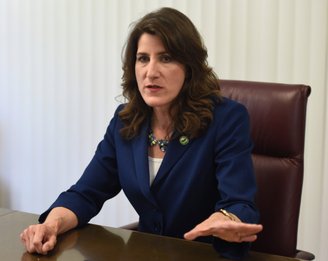
Gov. Gavin Newsom, flanked by legislators and gun control advocates, signed 15 gun safety-related bills in October, but in some ways, local authorities say, the state’s penalties remain lax. Photo for CalMatters by Dan Morain.
###
On paper, William Carl Adkins is a perfect candidate for prosecution under California’s tough gun control laws. At 34, he has a rap sheet that dates to 2007 and includes possession of drugs with intent to sell, vehicle theft, burglary, drugs again, and, in 2014, being a felon in possession of a firearm. That was the first gun arrest.
This time, police in the Fresno County town of Selma suspected Adkins was involved in an attempted homicide, and contacted the U.S. Marshals Service for assistance in his apprehension. On Feb. 22, local cops and federal agents spotted him, tailed him for a few blocks and converged.
“I have a gun on me,” Adkins told officers, according to court records. A .40 caliber Glock was tucked into his waistband. Its serial number matched one stolen in a burglary in Fresno in 2018.
Under California law, felons caught in possession of a firearm could face up to three years in prison, and serve only half that time. Under federal law, they face 10 years.
Such a case typically would go straight to the Fresno County District Attorney for handling in the state’s criminal justice system. But with local authorities’ consent, the U.S. Attorney for the Eastern District of California, which runs from Bakersfield to the Oregon border and includes 8 million residents, is prosecuting Adkins federally.
California has some of the nation’s strongest gun control laws, with 15 more signed into law Friday by Gov. Gavin Newsom. Gun control advocates here are quick to criticize the Trump administration and the Republican-controlled U.S. Senate for failing to pass strong gun safety laws. At his bill signing, Newsom called out U.S. Senate Majority Leader Mitch McConnell of Kentucky again for failing to bring gun legislation to a vote, calling him “cowardly in the face of this moment” and saying he “lacks resolve, character and leadership on this issue” with “people’s lives … hanging in the balance.”
But as happened in Selma, local police in California have increasingly been turning to federal authorities for help prosecuting gun crimes. The reason? Adkins and people like him face far more time behind federal bars than they would if they were prosecuted under state law.
The program under which his case is being handled, Project Safe Neighborhoods, got its start in 2001 under President George W. Bush. It fell out of favor during the Obama administration, but the Justice Department under then-Attorney General Jeff Sessions reinstated it.
The idea is to seek out suspects considered to be especially dangerous and maximize their prison time by prosecuting them through the federal system. Under California law, felons caught in possession of a firearm could face up to three years in prison. That sentence could be reduced by half for good behavior. Some felons caught with guns end up doing time in county jails.

U.S. Attorney McGregor W. Scott says federal gun crime prosecutions in California have been “going gangbusters” under the revived Project Safe Neighborhoods.
Under federal law, however, they face 10 years in prison, and must serve at least 85% of that sentence. Since 2018, 175 individuals have been indicted on federal charges of being a felon in possession of a firearm in the Eastern District, and 161 have been sentenced to prison.
“One of the top priorities given to the United States attorneys at the outset of this administration by Attorney General Sessions was to reduce violent crime because it had spiked up to previous years nationally,” U.S. Attorney McGregor Scott of Sacramento said. “We’ve been going gangbusters ever since.”
In September, federal grand juries indicted:
- A 28-year-old Sacramento ex-felon who was accused of selling a gun after he left a parole office. Authorities found an AR-15 assault rifle that had no serial number.
- A 32-year-old Sacramento ex-felon on a variety of charges including shooting at a federal agent and possessing multiple firearms, including two machine guns. He faces life in prison if convicted.
- A 27-year old Bakersfield ex-felon on charges of being a felon in possession of a firearm, a Glock that had been converted into a fully automatic machine gun. He faces 10 years in a federal penitentiary.
- A 58-year-old ex-felon who had a semi-automatic weapon, after previously having been convicted of being a felon in possession of a gun.
“We’re not taking all of them, not by any stretch of the imagination,” Scott said. “We focus on people with lengthy criminal records, prior convictions for crimes of violence, and focus on those, because those are the problems in these communities.”
In 2016 and again in 2018, then-Assemblywoman Catharine Baker of Dublin, a Republican, introduced legislation to increase the sentence under California law for being a felon in possession of a firearm to a maximum of six years.
Baker, who was unseated in the 2018 Democratic wave, was the rare Republican who was disliked by the National Rifle Association and highly thought of by gun control advocates. She carried bills on behalf of the Brady Campaign to Prevent Gun Violence.
“Felons who illegally possess firearms are exactly the folks we ought to get behind bars,” Baker said. “They are thumbing their nose at society.”
Her bills never got far.
The ACLU and public defenders opposed them, citing the need to keep prison populations from increasing.

Former Assemblywoman Catharine Baker twice introduced legislation to increase the state sentence for being a felon in possession of a firearm. Photo by Susan Tripp Pollard/Bay Area News Group
In a letter opposing Baker’s 2018 bill, the county public defenders argued that “non-violent weapons laws are disproportionately enforced against minorities, so any enhanced sentence for this violation will likely have a disparate impact on nonwhite community members.”
Her legislation stalled in its first committee, the Assembly Public Safety Committee. Its chair, Assemblyman Reggie Jones-Sawyer, a Los Angeles Democrat, opposes almost any bill that would add to prison time.
Baker believes she could have won passage if her bills made it to the Assembly floor. Republicans and many Democrats support such measures.
“I have no doubt I would have gotten the votes,” Baker said. “Most moderate Democrats would have found it appealing.”
Democratic Assemblyman Mike Gipson of Compton said there is “debate” over whether felons who have served their debts to society should have their gun rights restored, though he hasn’t taken a side on that debate. Among the legislation Newsom signed Friday was a Gipson bill restricting the sale of gun parts to ex-felons or people with a history of mental illness.
Newsom said he was unsure whether or not state sentences for felons who possess firearms are sufficient: “My biggest issue is getting these guns out of the hands of felons. … If the law itself is inadequate as it relates to sentencing guidelines, honestly I don’t have a good assessment of that.”
Local authorities still handle the vast majority of cases involving felons in possession of guns. But they do turn to Uncle Sam for a select few, especially in Fresno County, where representatives from local law enforcement and the U.S. Attorney’s office meet to discuss potential cases roughly once a week.
“The purpose of that discussion is to determine if we’d get more bang for our buck if we charge this person federally,” said Fresno County Undersheriff Steve Wilkins.
Wilkins said the program has benefits beyond longer sentences. For instance, local gang members can be isolated from each other by being sent to serve their time in a federal facilities anywhere in the country.
“It might make it harder for them to communicate with their gang or call the shots,” Wilkins said.
Fresno County has the highest number of federal indictments on the charge in the Eastern District, and 62 have been sentenced to prison. Solano County west of Sacramento is second with 24.
Sacramento County District Attorney Anne Marie Schubert said the tactic is, in a sense, more in line with California’s philosophy than California’s own, lighter penalties for felons caught with firearms: “If we’re going to regulate the use of guns, why wouldn’t we regulate guns to the best of our ability? It’s almost like an oxymoron,” she said.
“We are talking about very dangerous people,” Schubert said, noting that a dozen people in her county have been sentenced on federal law since 2018. “We want to make sure we seek the best tools to keep the community safe. ”
###
CALmatters.org is a nonprofit, nonpartisan media venture explaining California policies and politics.
CLICK TO MANAGE